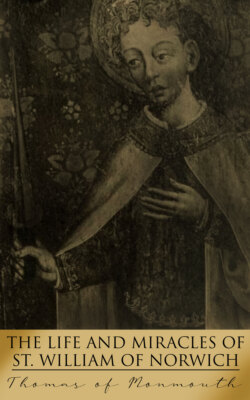The Life and Miracles of St. William of Norwich

Реклама. ООО «ЛитРес», ИНН: 7719571260.
Оглавление
Thomas of Monmouth. The Life and Miracles of St. William of Norwich
The Life and Miracles of St. William of Norwich
Table of Contents
INTRODUCTION
CHAPTER I. THOMAS OF MONMOUTH
CHAPTER II. THE BENEDICTINE PRIORY AT NORWICH
CHAPTER III. EAST ANGLIA IN THE REIGN OF KING STEPHEN
CHAPTER IV. THE NORWICH JEWS
NOTE
THE POLITICAL CONDITION OF NORWICH IN THE MIDDLE OF THE TWELFTH CENTURY, AS LIKELY TO AFFECT THE JEWS RESIDENT IN THE CITY
CHAPTER V. THE MANUSCRIPT
CHAPTER VI. THE LEGEND
CHAPTER VII. THE CULT AND ICONOGRAPHY OF ST WILLIAM
CHRONOLOGICAL TABLE
ADDITIONAL NOTE
THE CHAPTERS OF THE FIRST BOOK
HERE BEGINNETH THE FIRST BOOK
THE CHAPTERS OF THE SECOND BOOK
CONTENTS OF THE THIRD BOOK
THE CHAPTERS OF THE FOURTH BOOK
HERE BEGINNETH THE FOURTH BOOK
THE CHAPTERS OF THE FIFTH BOOK
HERE BEGINNETH THE FIFTH BOOK
THE CHAPTERS OF THE SIXTH BOOK
HERE BEGINNETH THE SIXTH BOOK
THE CHAPTERS OF THE SEVENTH BOOK
HERE BEGINNETH THE PROLOGUE TO THE SEVENTH BOOK
HERE ENDETH THE PROLOGUE, AND BEGINNETH THE SEVENTH BOOK
Отрывок из книги
Thomas of Monmouth
Translator: Augustus Jessopp, Montague Rhodes James
.....
In the very valuable collection of Pleas of the Crown edited by Prof. Maitland for the Selden Society in 1887, there are no fewer than fifteen instances of a resort to the ordeal by water, and nine to the ordeal by hot iron between the years 1200 and 1225; in one case, both forms of the dreadful process appear to have been put in force simultaneously. When the cry rose up from the cruel crowd at the Norwich synod, calling for the Judgment of God, the denials and protestations of the wretched Jews went for nothing, and if the fierce-eyed fanatics could have had their way, there would have been just as little chance of escape for their victims as there had been a thousand years before, when just such a loud and hateful cry had been answered by flinging the Christians to the lions. Happily the time was coming when these detestable perversions of justice, which had too long been allowed to go on under the blasphemous pretence of invoking the Heavenly Father to do justice between man and man, were abolished. The popes had very early set themselves against the ordeal: but it took a long time before the populace or their rulers could be brought to a better mind and to regard these abominations in their true light.
Though the Lateran Council of 1215 formally forbade any ecclesiastic taking part in these ordeals, and though by this time all the great theologians condemned and denounced them as having no warrant in divine law and forbidden by the Church—yet the superstition, like every other superstition, died hard, and the other form of ordeal—the trial by combat—survived long after the others had ceased to be sanctioned or resorted to.
.....